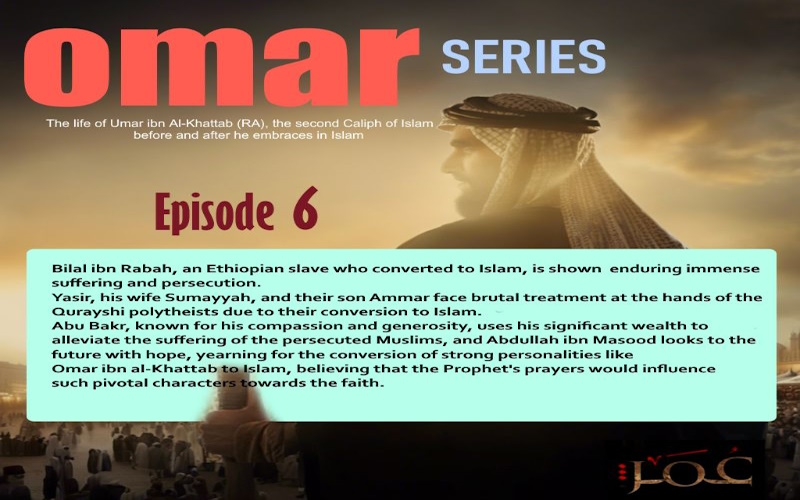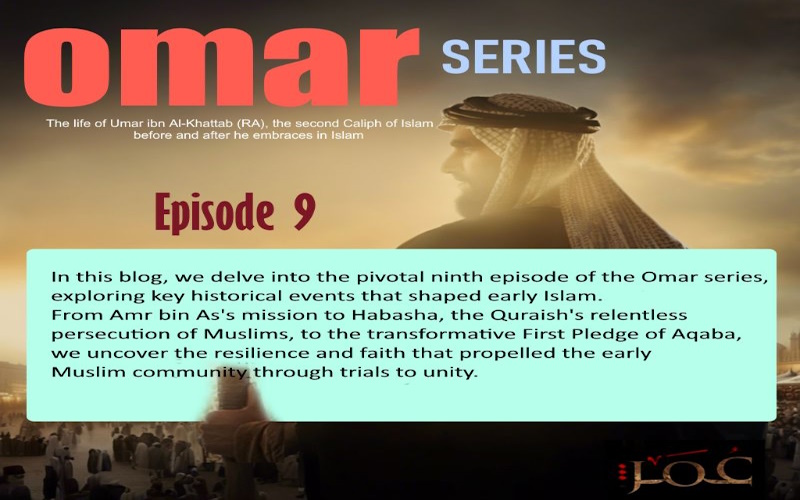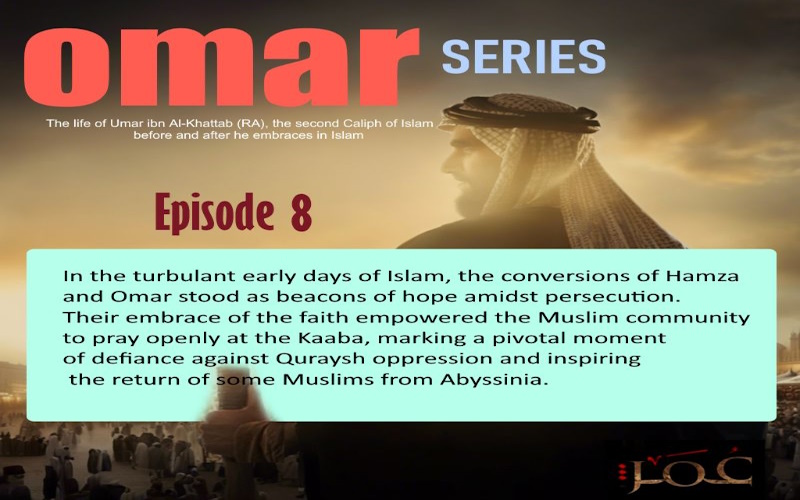In the rich history of Islam, few stories are as moving as that of Bilal ibn Rabah, who kept his faith under immense torture and persecution. Then, you meet people like Abu Bakr, who became the source of compassion and tried to ease their pain. The sixth episode of the popular Omar series brings these stories to life powerfully and profoundly, showing the loyalty of Bilal and the ultimate sacrifice presented by the family of Yasir.
Bilal ibn Rabah:
This episode not only captures the essence of early Islamic struggles but also highlights the transformative impact of Islam on individuals and society. The story unfolds with a powerful depiction of faith and resilience in the face of intense hardship. The scene captures Umayyah bin Khalaf’s relentless effort to compel Bilal to utter the praises for Al-Laat and Al-Uzza, which he refuses repeatedly by uttering the words “Ahad, Ahad”. This proves a surprise for Safwan, Khalid bin Waleed and Ikramah, who had known Bilal to be wise but weak in his physical strength. This pivotal moment captures the essence of Islam, that genuine faith emerges from within, unaffected by external pressure.
He was strong because his faith had taken root in his heart, which was summed up in his constant prayer, “Ahad, Ahad,” which means “Allah is one.” This scene is a powerful reminder of how determined the early Muslims were and how Islam sparked a spiritual rise in all of its followers, no matter what their social status was.
The role of Wahshi, as presented in this episode, highlights Bilal’s position. In conversation with Rehana, he says he doesn’t understand why Bilal is willing to endure such pain. The fact that Wahshi couldn’t understand Bilal’s strength shows how faith can transform people in ways that seem illogical to people who haven’t felt it.
The purchase of Bilal’s freedom by Abu-Bakr is well documented in Islamic history. According to historians, Umayyah bin Khalaf demanded an excessive amount of money for his release, which, to his surprise, was met with a swift acceptance by Abu-Bakr.
This shows Abu Bakr’s compassion and willingness to use his wealth to ease the pain of early Muslims.
The story then moves on to Abu Bakr’s personal life, where his father criticises him for wasting his money on the poor and weak of society. He mentions the likes of Amr ibn Khuairah, Umm Umays, Zunairah, and Bilal, who were either maids, slaves or perceived as people with no influence in society. Abu-Bakr’s reply sums up Islam’s natural essence and spirit: “I am doing this to please Allah”.
Family of Yasir:
Abu Jahl tortured the family of Yasir, who were the early Muslim converts. Sumayyah, Yasir’s wife, shows extraordinary courage by denouncing Abu Jahl while professing her beliefs in front of him. Abu Jahl responded by ruthlessly killing her, making her the first martyr of Islam.
Following Sumayyah’s martyrdom, Yasir, who was also under harsh persecution, succumbed to the trials and passed away during the night.
Ammar’ the son of Yasir and Sumiyyah, was also subjected to immense torture by Abu Jahl. He was threatened and tormented to the point where he recanted his faith under pressure, saying phrases that contradicted his views.
Ammar, worried by his apparent weakness, sought consolation and support from Abu Bakr. Who took him to the prophet Mohammad, who asked him. “Did you curse me with your tongue or with your heart? Meaning, was this something that happened just externally, or did you also mean it internally? And he said, Wallahi, O Messenger of Allah, I swear by Allah, it was just with the tongue, just to escape that persecution. And the Prophet said, if they do it to you again, then do it again.
He understood that Ammar was under intense pressure. But where was the faith of Ammar? The faith of Ammar was in the regret that he felt after he did that. The faith of Ammar was in the intense love that he felt for the Messenger, salallahu alayhi wa sallam.
Role of Wahshi:
The episode illustrates Wahshi’s disappointment and subsequent sentiments of hopelessness after learning of Bilal’s liberation.
Wahshi’s decision to prioritise his freedom over religion highlights his internal struggles and choices within his circumstances. His resolve to obey his master and his hope for eventual freedom reflects the challenging reality of those living as slaves in that society.
Abdullah bin Masood encounters Omar:
In the recounted incident, Abdullah ibn Masood encounters Abu Jahl, who not only taunts and threatens him but also physically attacks him, resulting in Ibn Masood being brought to the ground.
After this encounter, Omar bin Khattab extends a helping hand and assists Ibn Masood, who appreciatively acknowledges this act of kindness. Ibn Masood then expresses to Omar, “By Allah, you are the best among the two,” emphasising the contrast between Omar’s supportive action and Abu Jahl’s hostility. Additionally, Ibn Masood hopes that the Prophet’s prayers will be for Omar rather than for Omar ibn Hishaam, reflecting his recognition of Omar’s more righteous conduct.
This is a depiction of the prayer made by the Prophet Mohammad, where he asks Allah to strengthen Islam with one of two men who were, at that time, opposed to Islam: Abu Jahl, who was one of the staunchest opponents of the Prophet, and Umar ibn al-Khattab, who would later become one of the Prophet’s closest companions and the second Caliph of the Islamic community after the Prophet’s death.
This narration is recorded in Sunan al-Tirmidhi, one of Sunni Islam’s six major hadith collections.
Ibn Umar reported: The Messenger of Allah, peace and blessings be upon him, said, “O Allah, strengthen Islam with one of two men whom you love more: Umar ibn Hishaam or Umar ibn al-Khattab.”
Source: Sunan al-Tirmidhī 3681
Rejection of faith from elders of Quraish:
The depicted scene captures the ridicule and rejection of the Prophet Muhammad by Umayyah ibn Khalaf and Walid ibn al Mugeera. Their mockery, as they question whether God had spoken to Muhammad, reflects the opposition and mockery encountered by the Prophet during his mission.
Their taunting statement, “Did God speak to you again, O Muhammad?” and the sarcastic remark about the Quran revealing verses against them, illustrate their frustration and helplessness towards the fact that they were unable to halt the growth of Islam despite harsh tactics.
The resolve of Abdullah ibn Masood:
The gathering at Dar-al-Arqam demonstrates a glimpse of the teachings and culture the early Muslims went through.
Their commitment to patience and non-retaliation in the face of persecution is a reminder of the early stage of dawah. There was a constant reminder to remain peaceful and that the people would eventually accept the message of Islam.
The decision to convey the message of the Quran to the people of Quraish through recitation reflects the believers’ dedication to spreading the message of Islam despite the challenges.
In conclusion, this episode of the Omar series is a deep look at the struggles and successes of the early Islamic community. We can feel the unbreakable spirit of faith that has inspired millions throughout history. The episode does a great job of weaving together themes of strength, sacrifice, and the transformative power of Islam.






